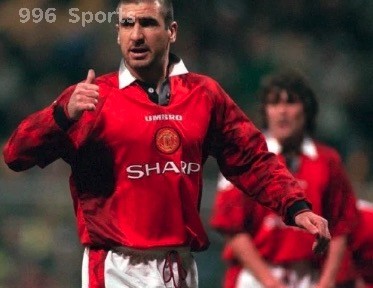Moratti: Not Signing Cantona Is One of My Biggest Regrets

Former Inter Milan president Massimo Moratti recently opened up in an interview with Radio Serie A, reflecting on the regrets of his career in football management. Among those regrets, he specifically mentioned his inability to sign Eric Cantona, a player who is widely regarded as one of the most iconic footballers of his generation. Moratti expressed his lingering disappointment, saying, "Regrets? There are many. Often, regrets are tied to the things you couldn’t accomplish, and not signing Cantona is one of them."
The Missed Opportunity: Cantona and Inter Milan
During the 1990s, Eric Cantona was at the peak of his career, playing a pivotal role at Manchester United under the legendary manager Sir Alex Ferguson. His charisma, skill, and leadership on the pitch made him a fan favorite and a crucial component of United's dominance in English football. It was during this time that Inter Milan, under the presidency of Massimo Moratti, made attempts to bring Cantona to Italy.
The pursuit of Cantona by Inter Milan was not merely a fleeting interest. According to Alessandro Mazzola, who was the sporting director of Inter Milan at the time, the club made serious efforts to negotiate with both Cantona and Manchester United. Mazzola recounted the experience, stating, "I went to see him and started negotiations, but taking him away from Manchester United was extremely difficult. The English club's demands were too high, and to complete the deal, we would have needed to execute a very complex operation that we simply couldn't afford at the time."
The Challenges of Signing Cantona
The difficulties mentioned by Mazzola highlight the challenges Inter Milan faced in trying to secure the services of a player of Cantona's caliber. At the time, Manchester United was not only reluctant to part with their star player but also well aware of his value, both on and off the pitch. Cantona was more than just a footballer; he was a symbol of United's resurgence under Ferguson—a player whose presence inspired both teammates and fans.
The financial demands from Manchester United were significant, reflecting Cantona's importance to the club. For Inter Milan, meeting these demands would have required a record-breaking transfer fee, something that was particularly daunting in the pre-modern era of football finances. The complexities involved in structuring such a deal, coupled with the high cost, ultimately made it an impossible task for Moratti and Inter Milan.
Cantona’s Legacy and What Could Have Been
Eric Cantona is often regarded as one of the most influential players in Premier League history. His impact at Manchester United was profound, helping the club to secure four Premier League titles and two FA Cups during his five-year stay. Sir Alex Ferguson famously considered Cantona one of the four world-class players he had the privilege of managing in his career, alongside Paul Scholes, Ryan Giggs, and Cristiano Ronaldo.
Had Cantona made the move to Inter Milan, the landscape of European football in the 1990s could have been markedly different. Inter was in a phase of rebuilding and striving to reclaim its position among the elite clubs in Italy and Europe. Cantona’s arrival might have provided the spark needed to elevate the team’s performance and perhaps even change the course of their domestic and international campaigns.
Moreover, Cantona’s influence extended beyond his technical abilities. His leadership, confidence, and unique personality had a galvanizing effect on Manchester United, and it’s intriguing to consider how he might have shaped the culture at Inter Milan had the transfer gone through. His presence could have potentially attracted other top talents to the club, setting off a chain reaction that might have led to greater success for Inter in the years that followed.
The Broader Impact on Football Transfers
The scenario with Cantona also sheds light on the broader context of football transfers during that era. The 1990s were a transformative period for football, with transfer fees beginning to escalate as television rights and commercial revenues grew. Cantona’s potential move to Inter Milan can be seen as a precursor to the era of blockbuster transfers, where top players began commanding fees that would have been unimaginable just a few years earlier.
If Cantona had left Manchester United, the fee demanded by the club would likely have set a new benchmark in the transfer market, similar to how Cristiano Ronaldo’s later move from United to Real Madrid in 2009 broke records. Such a transfer could have accelerated the trend of increasing transfer fees and altered the financial landscape of football even earlier than it did.
Reflections on a Missed Opportunity
For Moratti, not signing Cantona remains a significant "what if" in his long tenure as Inter Milan’s president. It's a reminder that even the most powerful and well-connected figures in football can experience moments of regret when deals don’t come to fruition. Despite Inter Milan’s successes over the years, including multiple Serie A titles and a Champions League victory in 2010, the thought of what Cantona could have brought to the club continues to linger.
In football, as in life, not every opportunity can be seized, and not every dream can be realized. Yet, these unfulfilled ambitions are part of what makes the sport so compelling. They leave room for speculation, debate, and the eternal question of what might have been.
Conclusion: The Legacy of Regret and Ambition
Massimo Moratti’s reflections on not signing Eric Cantona highlight the challenges and complexities involved in high-stakes football negotiations. While the deal never materialized, the story remains a fascinating chapter in the history of both Inter Milan and Eric Cantona. It serves as a poignant reminder of the fine margins that can separate success from regret in the world of football.
As fans and historians look back, they can only imagine the impact Cantona might have had at Inter Milan and how football history might have been different. For Moratti, this missed opportunity is a testament to the ambitions that drive football's most passionate leaders and the inevitable regrets that accompany them.
